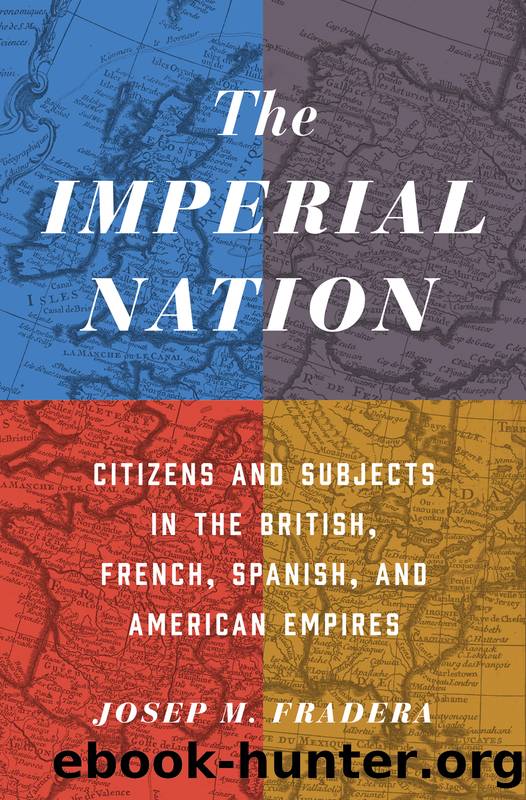The Imperial Nation by Fradera Josep; MacKay Ruth;

Author:Fradera, Josep; MacKay, Ruth;
Language: eng
Format: epub
Publisher: Princeton University Press
Published: 2018-07-14T16:00:00+00:00
Citizenship and Its Negation in the Imperial Republic
In the liberal Anglo-British monarchy, which was the ultimate winner of the great counterrevolutionary war of the early nineteenth century, the concept of citizenship as a precise political status made little sense.82 Rather, the idea that counted was that of the elector, the subject of the gracious queen, along with an imprecise notion of rights established through positive law. The general idea of subjecthood through birth—articulated already in the seventeenth century, dislocated in the eighteenth century as people removed from their place of origin developed the notion of “alien” through systematic contact with new and strange neighbors, and then reaffirmed during the North American crisis—could be gently shifted toward uncertain imperial citizenship guaranteeing access to justice and a certain amount of protection to those born under British sovereignty, though that did not mean much with regard to a subject’s particular status.83 British subjecthood obviously meant one had to obey British laws, which in the nineteenth century continued emanating from Westminster, “transmitted primarily through the exercise of the royal prerogative, administered by governors with plenary powers,” although, for reasons we have mentioned, they also came from parliaments or governments in remote places, part of a pyramid that was susceptible to many interpretations.84 Subjectood also implied a diffuse right of access to tribunals and the ability to seek assurance from authorities that the law would be applied.85 As we have also seen, the rights of some people born within imperial boundaries might occlude the rights of others born within those same boundaries, though not (according to the Georgians and Victorians) within representative institutions guaranteeing British identity in the metropolis and throughout the empire.86 It was there that racial archetypes and differences in culture and/or phenotype, and the possibility of overcoming those barriers through numbers or intermarriage, began having an impact beyond any books or debates about the human race. This is a crucial point, as it shows how advances in the rights of some were accompanied by their diminishment or obliteration in the case of others. As Julie Evans has noted, not having the right to vote was an indication of one’s social level and had serious consequences in the crown’s four dominions (Canada, New Zealand, Australia, and South Africa), where the rules of the game for compatriots increasingly were similar to those of the metropolis (and in fact were better, in terms of democracy, for those of British origin).87 Therefore, the exclusion of people from the electoral rolls, as in South Africa, or the outright elimination of assemblies, as in Jamaica and elsewhere (with the exception of Barbados) in the Caribbean in 1865, as explored in chapter 8, were acts with huge political and social consequences for certain groups.88 Here lay the dynamic underlying the construction of liberal empires starting with the eighteenth-century revolutions: the written or unwritten notion of specialness, with its impact on particular situations and on social complexes everywhere.
In the Don Pacifico affair, Britain displayed its hegemonic ambitions (shared by all empires): its professed right to defend British subjects being ill treated in foreign countries.
Download
This site does not store any files on its server. We only index and link to content provided by other sites. Please contact the content providers to delete copyright contents if any and email us, we'll remove relevant links or contents immediately.
| Africa | Americas |
| Arctic & Antarctica | Asia |
| Australia & Oceania | Europe |
| Middle East | Russia |
| United States | World |
| Ancient Civilizations | Military |
| Historical Study & Educational Resources |
Life of Elizabeth I by Alison Weir(1855)
The Invisible Wall by Harry Bernstein(1690)
Art of Betrayal by Gordon Corera(1357)
1916 in 1966 by Mary E. Daly(1160)
Thunderstruck by Erik Larson(1090)
The Decline and Fall of the British Empire, 1781-1997 by Piers Brendon(1043)
A Brief History of Britain, 1066-1485 by Nicholas Vincent(983)
A Brief History of Britain, 1485-1660 by Ronald Hutton(949)
Mary, Queen of Scots by Weir Alison(929)
Guy Burgess by Stewart Purvis(925)
The Last Lion 02 - Winston Churchill - Alone, 1932-1940 by William Manchester(856)
Henry VIII by Alison Weir(832)
1066 by Andrew Bridgeford(793)
Coalition by David Laws(774)
The Last Plantagenet by Thomas B Costain(773)
London: A Biography by Peter Ackroyd(770)
Lang Lang by Lang Lang(770)
Gimson's Kings and Queens by Andrew Gimson(750)
Diana by Andrew Morton(731)
